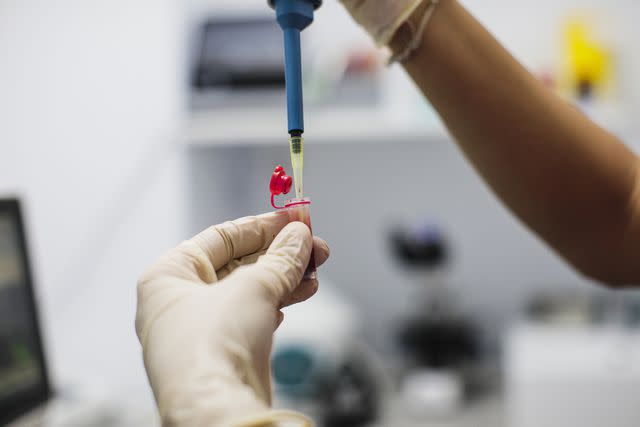Amyloidosis Genetic Testing to Assess hATTR Risk
Genetic testing can unlock early treatment and may even be lifesaving
Medically reviewed by Steffini Stalos, DO
If one of your close biological relatives has been diagnosed with amyloidosis, your healthcare provider might recommend that you undergo amyloidosis genetic testing, a blood test to help assess amyloidosis your risk. Amyloidosis is a rare disease that causes proteins to build up in the body. It can lead to organ failure and even death, but treatment can reduce symptoms.
Hereditary transthyretin amyloidosis, or hATTR, refers to the inherited type of disease that can cause heart disease, liver disease, and other complications. Understanding your risk for hATTR through genetic testing can help you get potential life-saving treatment sooner.
Continue reading to learn more about amyloidosis genetic testing, including the role of genetics in hATTR, who should explore genetic testing, and the process of getting a blood test for amyloidosis.

Lourdes Balduque / Getty Images
Role of Genes in hATTR Amyloidosis
Your genes impact your life greatly, including what disease you’re at risk for developing. A genetic mutation (or change) that impacts how your body makes the protein transthyretin (TTR) in your liver causes hATTR amyloidosis. Because of the genetic mutation, TTR folds, causing it to build up in the body. There are more than 120 possible genetic mutations that cause hATTR.
Sometimes, you need two sets of a mutated gene to inherit a genetic condition. But the gene mutations that cause hATTR amyloidosis are dominant, meaning that you only need to inherited the mutation from one parent to have increased risk of the disease.
If you have a parent with the hATTR mutation, you have a 50% chance of having the mutation too. Most people who have the mutation will develop hATTR amyloidosis. However, the mutation doesn’t mean that you’ll definitely develop hATTR. Genetic testing can reveal the specific mutation you have, and healthcare providers vcan use that information to explain your risk of developing amyloidosis.
Who Is Amyloidosis Genetic Testing For?
If you have a first-degree biological relative who has hATTR amyloidosis, you should consider amyloidosis genetic testing. That means that if your mother, father, sibling, or child has the disease, you should be tested. Since hATTR amyloidosis is treatable, it's best to know you have the condition early on, when treatment can be most impactful.
Sometimes, providers recommend testing if you don’t have a family history of hATTR amyloidosis, but have symptoms of the amyloidosis, including:
Neuropathy
Carpal tunnel syndrome
Bilateral carpal tunnel syndrome
Spinal stenosis
hATTR Amyloidosis Genetic Testing Process
Physically, amyloidosis genetic testing is straightforward. Your primary healthcare provider or the medical team working with your recently diagnosed relative should be able to guide you. Talk to them about your medical coverage. Most insurance plans cover genetic testing, but you may need prior authorization, or permission before the test is done.
After talking with you about the role of genetics in hATTR amyloidosis, healthcare providers will collect a blood or saliva sample. The sample is sent to a lab, which analyzes DNA through a process called genome sequencing.
The lab worker will pay particular attention to the more than 120 variants that are known to be associated with hATTR amyloidosis. Typically, results are ready within a few weeks. Sometimes, a biopsy may be needed.
Genetic Testing Anxiety and Coping With Emotions
Genetic testing can reveal serious information. Genetic testing should always be coupled with genetic counseling. A genetic counselor will help you understand how the results of your test will impact your health and well-being.
Although hATTR amyloidosis is a serious disease, getting early treatment is the best way to improve the outcome. With early treatment, you can avoid some of the more severe, even deadly, complications of hATTR amyloidosis. Knowing that you’re at risk for the condition is frightening, but knowledge is power. You’ll be able to get the best possible healthcare once you know the results.
hATTR Amyloidosis Genetic Test Results
The results of genetic testing will show not only whether you have a genetic mutation that can cause hATTR amyloidosis, but also which specific mutation you have. This is important since different mutations impact how likely you are to develop the disease, at what age, and what types of symptoms you’re most likely to experience.
Here’s an overview of the three most common types of mutations in Americans:
VI22I: This mutation is most common in people of West African heritage. About 3% of Black Americans have this gene, but many don’t develop symptoms. It’s associated with heart disease.
T60A: This mutation is most common in people with Irish ancestry. It’s associated with heart disease and nerve damage.
V30M: This mutation is found in people whose ancestors were from Japan, Portugal, France, Spain or Sweden. It’s associated with nerve-related symptoms.
Next Steps
If you learn that you have a gene mutation that’s linked with hATTR amyloidosis, you should work closely with your healthcare team. A hematologist (medical doctor who diagnoses, treats, and manages blood diseases) will often lead your care.
The first steps will include testing to see if you’ve actually developed amyloidosis. Your healthcare provider will also discuss treatment and prevention strategies to help you live a long, healthy life.
In addition to thinking about your own care, you should consider your biological relatives. If you have a mutation, your parents, siblings, and children should all be tested (if they haven’t been already). Some hospitals offer testing for free to family members of someone with a recently detected mutation.
Summary
Amyloidosis genetic testing is recommended for anyone who has a close relative with hATTR amyloidosis. This rare genetic disease can lead to heart failure and nerve-related symptoms. However, early diagnosis is crucial for improving your outcome. Genetic testing can be frightening, but will also help you and your family members access the best care possible.
Read the original article on Verywell Health.

